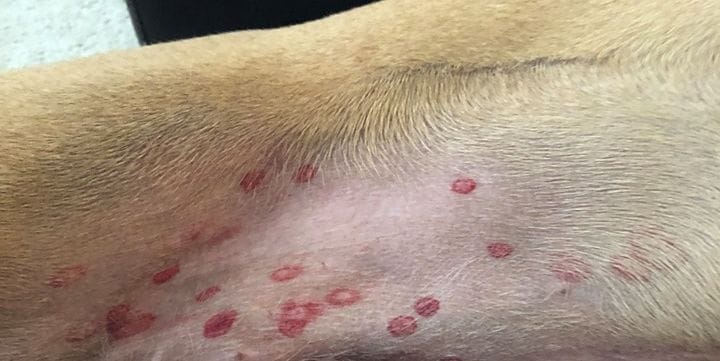If you’re a dog owner and you see red circles on your dog’s stomach, your first instinct would probably be to go running to the vet. It’s only natural, we want the best for our babies. But those red splotches might not affect your dog as much as you think they do.
On it’s Facebook page, the Morinville Veterinary Clinic in Alberta, Canada, recently shared a message about the common affliction in order to reassure any worried pet parents.
The post reads, “We are getting more and more phone calls about red bites on your dog’s stomach. These are a type of fly bite, and dogs generally get them from laying in the grass. They look terrible, but usually do not bother the dogs. They heal quickly on their own and do not require any treatment. These flies are usually around for a few weeks every spring and then go away. We hope this eases any worry that you may have had about your own dog!”
After posting, the message quickly went viral as Facebook users came together to commiserate about finding similar bites on their pets – and also expressing gratitude for having been spared paying a vet bill.
As Spring starts, we are getting more and more phone calls about red bites on your dogs stomach. We wanted to give…
Posted by Morinville Veterinary Clinic on Thursday, May 23, 2019
“Thank you for the information. I was just getting ready to run out to the vet and spend a good $200 I really don’t have,” one person wrote.
And who exactly is the reason for those awful-looking bite marks?
Michael San Filippo, a spokesman for the American Veterinary Medical Association (AVMA), said, “These appear to be bites from black flies, which are widely spread across North America, particularly the northern latitudes. Bites from these flies on dogs are usually harmless, but we’d caution pet owners not to ignore or downplay these kinds of bites, as there may be other causes that could cause similar markings that indicate more of a threat to our pets.”
Those could potentially include other bugs or pests, or even allergic reactions to various environmental triggers. Because problematic bites could look similar in appearance to these, it is always best to proceed with caution and see a vet if you’re really concerned about your dog.
“If you notice any unusual bites or injuries or behaviors, you should contact your veterinarian to discuss,” San Filippo says. “There are a number of factors to consider, such as your pet’s age, medical history, and health status, as well as the specific health threats to your pets where you live.”
When it comes to pet health, it’s always better to be safe than sorry.











